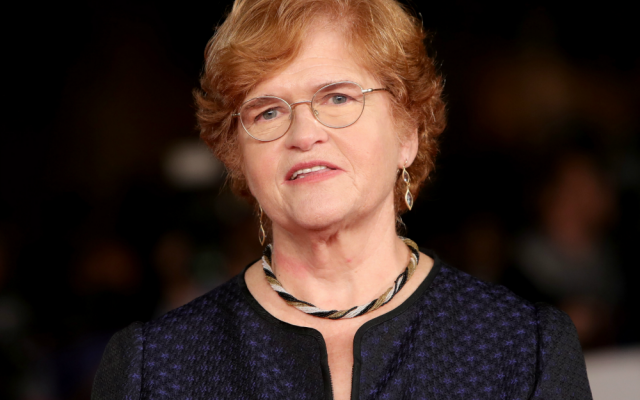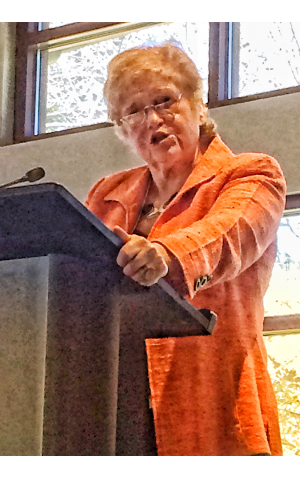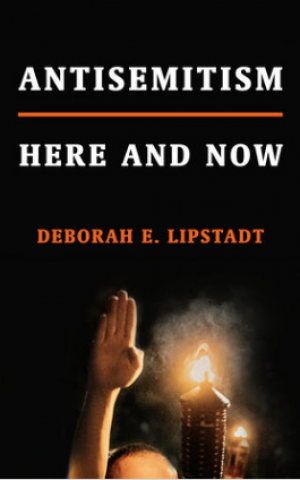Lipstadt Issues Call to Action on Campuses
Amid a rising tide of anti-Semitic incidents on college campuses, Emory University professor Deborah Lipstadt has issued a call to action to protect freedom of expression.

Amid a rising tide of anti-Semitic incidents on the nation’s campuses, Emory University professor Deborah Lipstadt has issued an energetic call to action to protect freedom of expression. She told an Emory conference on “Academic Freedom and Free Speech On Campus” March 22 that universities must take a more active role in encouraging the free exchange of ideas.
“Nothing should trump free speech,” she said. “Some of what we are currently seeing on campus, like shouting down speakers or faculty invitations only to speakers who make students feel comfortable, and even physical attacks on speakers, are examples of a failure to understand what a university truly is.”
The Anti-Defamation League has noted in recent years a sharp rise in racial and religious intimidation. In 2017, the ADL reported more than 200 incidents of anti-Semitism at colleges and universities, an increase of 89 percent over the previous year. The ADL’s Center on Extremism last year pointed out that white supremacists had targeted college campuses for the distribution of hate literature.
There has been an increase of hate on both the left and the right. In an op-ed in The Washington Post in October, ADL Executive Director Jonathan Greenblatt pointed out that “anti-Israel campaigns that demonize the Jewish state and its supporters have gained momentum. Dozens of campuses have held ‘Israeli Apartheid Week’ events, and the Boycott, Divestment and Sanctions, or BDS, movement, which promotes policies that would end Israel’s existence as a Jewish state, has spread widely over the past decade.”

Lipstadt’s strident condemnation of what is happening in higher learning today also comes amid a surge in anti-Semitic incidents at colleges and universities around the country. Just weeks after the murder of 11 congregants at the Tree of Life synagogue in October in Pittsburgh, a Jewish psychology professor at New York’s Columbia University found her office vandalized with red spray-painted Nazi swastikas and the word “yid” scrawled on her wall. The same sort of attack followed a vigil at the University of Tennessee for the murdered congregants, and at Duke University in North Carolina, where a mural in memory of the Pittsburgh victims was defaced with Nazi symbols.
Lipstadt, who published a book on contemporary anti-Semitism earlier this year, is not just concerned about attacks on free speech in America, she also sees the rise of nationalist political movements in Eastern and Western Europe as a warning sign.
“I’m very disturbed,” she told her audience at Emory. “What I see happening in this country, what I see happening in other authoritarian countries. There is a rise of authoritarianism and anti-Democracy populism, whether you’re looking at Hungary or the AFD, the Alternative for Deutschland party in Germany, or in Italy. They are antithetical to freedom of speech, antithetical to freedom of the press, antithetical to this freedom of ideas. And I think it’s a dangerous, dangerous trend. And the more I study contemporary anti-Semitism, the more I saw this trend as a real threat.”
 Lipstadt has been an unwavering voice in contemporary media against the increase in hate speech and violence. Her warning in Time magazine last year after the Pittsburgh massacre was typical of what she sees as a threat to all Americans.
Lipstadt has been an unwavering voice in contemporary media against the increase in hate speech and violence. Her warning in Time magazine last year after the Pittsburgh massacre was typical of what she sees as a threat to all Americans.
“Do not think that this attack is only about Jews. It may start with the Jews, but it never ends there. And conversely, it may start with others – Muslims, African Americans, LGBTQ identifying folks – but it will ultimately reach Jews. Lost in the legitimate media attention to the pipe bomber and the Pittsburgh murderer was the fact a few days earlier in Kentucky two African-Americans were murdered outside a supermarket by an alleged white nationalist.”
But while Lipstadt argued at the Emory conference that injustice had no place in the academic environment, she urged that the fight against extremism be strategic.
“We must remember that it’s in the free exchange of ideas that extremists are revealed to be the extremists that they are. And it’s in the free exchange of ideas that truth is brought to light and prejudice and intolerance are revealed for what they are.”
What is going on in our society, she concluded in her Time magazine essay, has the potential to teach all of us something, whether on a college campus or not.
“In Jewish tradition, upon mourning the dead, we say: May their memory be for a blessing. Today we should say: May the memory of all those killed and the suffering of those who have been wounded be for a blessing and for a lesson.”
Bob Bahr will be teaching a five-week course at Temple Sinai, starting Tuesday, April 2, based in part on Deborah Lipstadt’s recently published writings. For more information about the course, “Books Into Film – Deborah Lipstadt and Antisemitism,” www.templesinaiatlanta.org.



comments